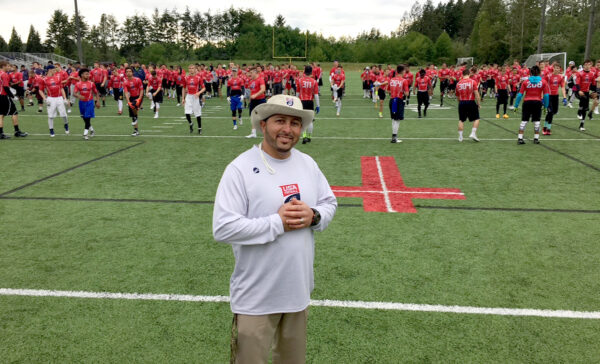This fall, through a partnership with the Seattle chapter of the National Alliance on Mental Illness, University of Washington Bothell Lecturer Laura Umetsu will help students better understand the impact of mental health on society while they learn essential business writing skills in her Business Writing course.

It’s an intersection that is rarely explored in business classrooms. Even before the pandemic, studies showed that instances of depression and anxiety were on the rise among college students, including business students. In 2021, students and new graduates, especially in the business discipline, are more stressed than ever.
“The pandemic has exacerbated the [mental health] crisis even more,” reports one Harvard study. “Now, nearly two thirds of employees across the globe report mental health as their biggest COVID-19–related challenge, and half of US workers are reportedly suffering from mental health issues. Top leaders are also struggling: about 80% of executives reported mental health issues in 2020 and 38% turned to drugs or alcohol to cope with symptoms.”
And yet, as this study points out, business schools “have historically presented business leaders and case protagonists as unaffected by outside stressors or health issues,” which leaves little room in the classroom to discuss how mental health impacts the business discipline.
Umetsu’s Business Writing class, by contrast, addresses that impact head-on.
A partnership born from experience

The interconnectivity of business and mental health is a topic Umetsu, who’s also a licensed attorney, has considered for a long time. Since 2005, she’s volunteered on and off with NAMI, one of the nation’s largest grassroots mental health organizations that educates and supports families and individuals affected by mental illness.
Umetsu became more consistently involved with NAMI Seattle following the 2008 recession, which prompted a few of her business school peers to attempt suicide.
“I’ve had several friends from college and throughout my life die by suicide,” said Umetsu. “I remember visiting one of my business school friends in the psychiatric ward, and they asked me to not tell anyone about their mental health condition. I thought that it was really sad that this person felt like they couldn’t tell anyone because of the huge amount of stigma.”
Her own experience growing up Asian American also prompted her to work on destigmatizing mental health, particularly for men and those of Asian background.
“I’m Asian, and we don’t talk about mental health,” she said. “You just don’t talk about it. Many older Asian Americans I was close to growing up never talked about mental health when I was younger but since then have become much more open to talking about it. Their openness now is in large part thanks to NAMI Seattle’s advocacy, support and education. So there is a lot of personal connection with my passion for working with NAMI.”
In 2015, Umetsu joined the organization’s board of directors and now serves as board emeritus, advising the board on issues such as donor relations.
Destigmatizing mental health
Being so heavily involved at the nonprofit, Umetsu felt it would be natural to bring NAMI into the classroom once she began lecturing at UW Bothell. Students from those first years say they gained a lot from the opportunity to partner with the organization.
“I was in one of Professor Umetsu’s classes when a few people from NAMI Seattle came out and shared their personal stories,” said Sarah Jensen, who took the class about two years ago. “It was really awesome because it gave way to other people in the class opening up and sharing their stories.”
Jensen graduated from UW Bothell in March with a degree in Business Management and is now planning to start her own sober living nonprofit with a focus on mental health. “I already had the dream to start my nonprofit before the class, but it was really refreshing to learn about this work being done in Seattle through NAMI,” she said. “I still remember the day they came and spoke with us.”
Last spring, Umetsu took the partnership further by creating an opportunity for students to practice their business writing skills. They wrote press releases for NAMI Seattle’s blog about its various activities, which gave them essential real world team-building and business writing experience.
“It’s valuable for them to be able to show actual work to potential employers and say ‘I’ve written a press release with this team, and here’s the hyperlink on my LinkedIn profile,’” Umetsu said. “Having real clients they have to answer to is incredibly valuable experience. It’s a relatively low-stakes practice run for real-life internship.”
This autumn quarter, Umetsu is again bringing NAMI into her writing course.
Teaching valuable business skills
Students work in teams to create content on the NAMI website that teaches about and destigmatizes mental illness, such as an interview Umetsu’s students conducted with James Donaldson, a former player with the Seattle Supersonics who has had a history of suicidal ideation. Other stories include one student’s experience growing up with anxiety and an introduction to a NAMI Seattle board member with bipolar disorder.
In addition to teaching students the mechanics of business writing and interviewing, the partnership allows Umetsu to include business ethics as they pertain to mental health.
“Mental health is something that all employees will have to confront or deal with, especially once they get to the managerial level,” said Umetsu. “What do you do when you’ve got an employee who is not performing up to their full potential because they have unresolved mental health issues?”
PrinseLena Allain-Pendergrass, a junior at UW Bothell studying business who took Umetsu’s class last spring, confirmed that she came away from the class with a better grasp of business writing and valuable skills for project management.
“In her class, we learned great things about general business writing etiquette — and how to approach difficult topics such as mental health. Hearing from the guest speakers and having the opportunity to interview them and write their story was extremely valuable,” said Allain-Pendergrass. “I’ve even been able to apply some of her teachings to my personal life.”
Humanizing mental health
This fall, Umetsu is also incorporating how mental health intersects with incarceration and how that pertains to hiring someone who has a history of incarceration. In her view, teaching students about the plight of previously-incarcerated workers, including the fact that they are more likely to be re-incarcerated if someone is unwilling to hire them, can make meaningful change in the community.
To further illustrate this point, Umetsu is bringing in Susan Mason, a formerly-incarcerated individual who is founder and executive of What’s Next Washington, a foundation that trains employers on how to hire individuals with a prior history of incarceration.
“She’ll be sharing about her experiences as a consultant and about how re-incarceration and mass incarceration intersect with mental health and not being able to get a job, how that affects mental health,” Umetsu added. “The potential social-justice impact in terms of being willing to look past a potential employee’s incarceration history is huge.”
Umetsu has also invited Judge David Keenan into her classroom to talk about his experiences as a juvenile defendant before he became a King County judge who oversees many cases that involve mental health.
“He’s going to talk about restorative justice and sentencing reform movements to decriminalize manifestations of trauma,” said Umetsu, adding that historically, “There are a lot of tax dollars wasted on criminalizing mental health issues.”
Impacting the community
By design, the students’ contributions to NAMI Seattle’s blog have become a valuable resource for individuals and the community as a whole.
“Our blog is important for raising awareness and getting more people engaged with our work,” said Katie Knoll, NAMI Seattle office coordinator. “But it probably would fall through the cracks if we didn’t have the posts coming in regularly from the students.”
In addition to helping NAMI Seattle, Umetsu hopes that by taking what they learn in the class into the workforce, her students will help make workplaces healthier and kinder places.
“This partnership serves to really humanize the problem and destigmatize conversations about mental health,” Umetsu said, “so students are more likely to be the kind of managers who will allow for accommodations that make for better employees and a better workplace overall.”


